2024届高考英语阅读中国传统文化专题02 中国民俗 二十四节气(素材+语法填空+书面表达) (含答案)
文档属性
| 名称 | 2024届高考英语阅读中国传统文化专题02 中国民俗 二十四节气(素材+语法填空+书面表达) (含答案) | 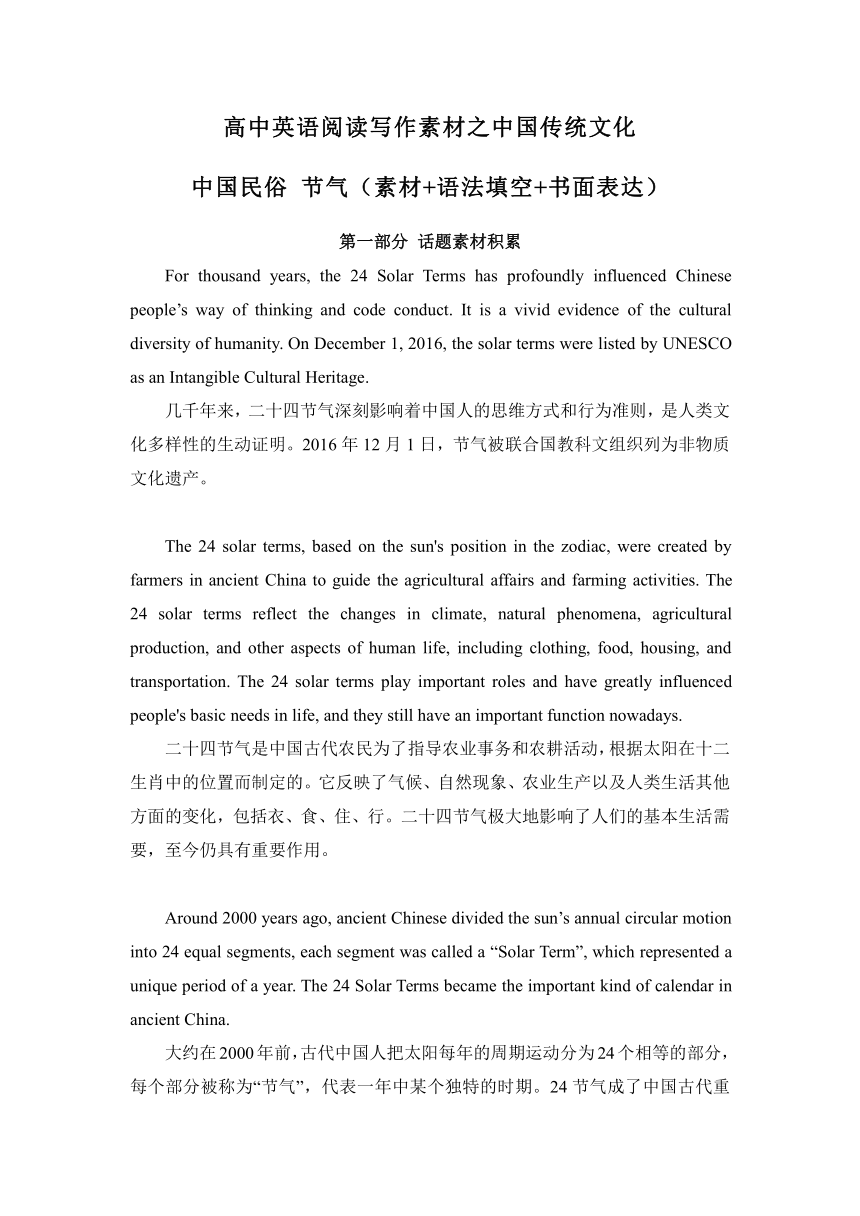 | |
| 格式 | docx | ||
| 文件大小 | 25.9KB | ||
| 资源类型 | 教案 | ||
| 版本资源 | 通用版 | ||
| 科目 | 英语 | ||
| 更新时间 | 2024-02-28 17:10:55 | ||
图片预览

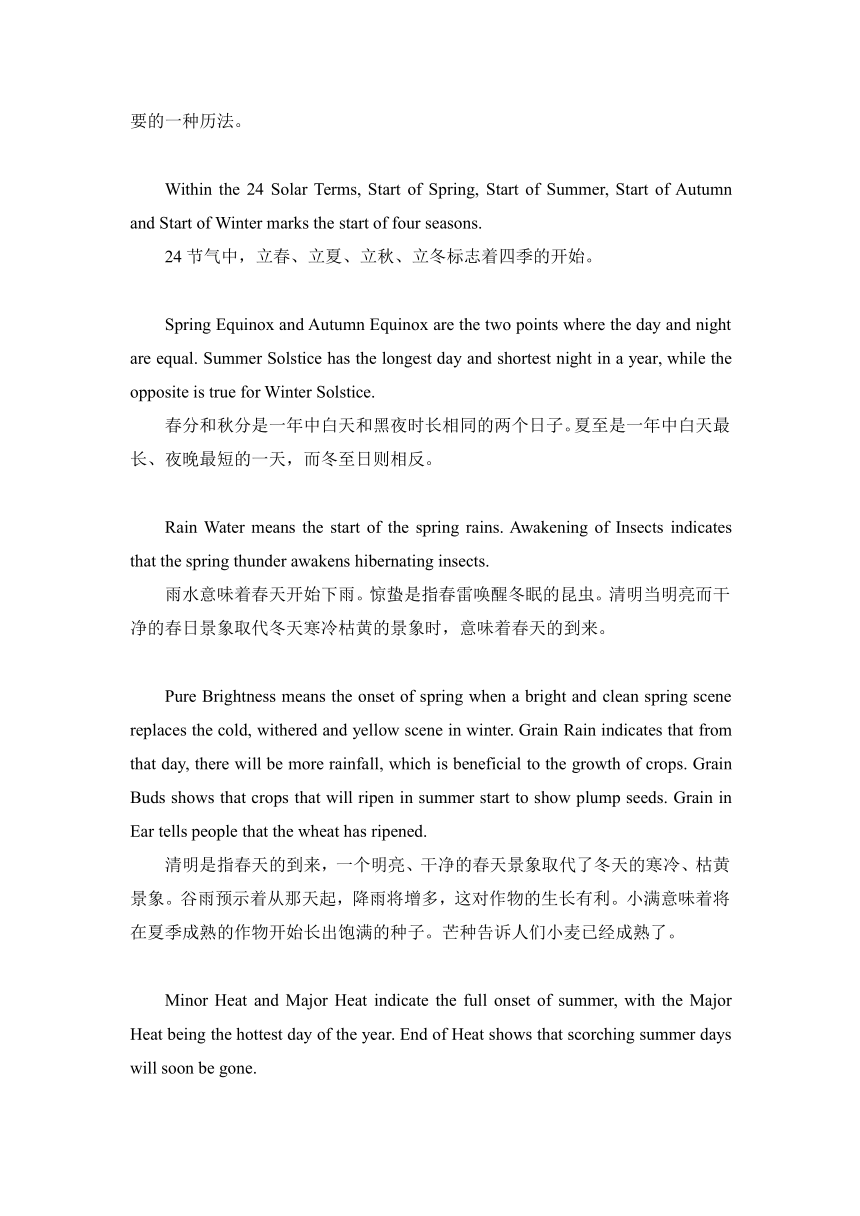
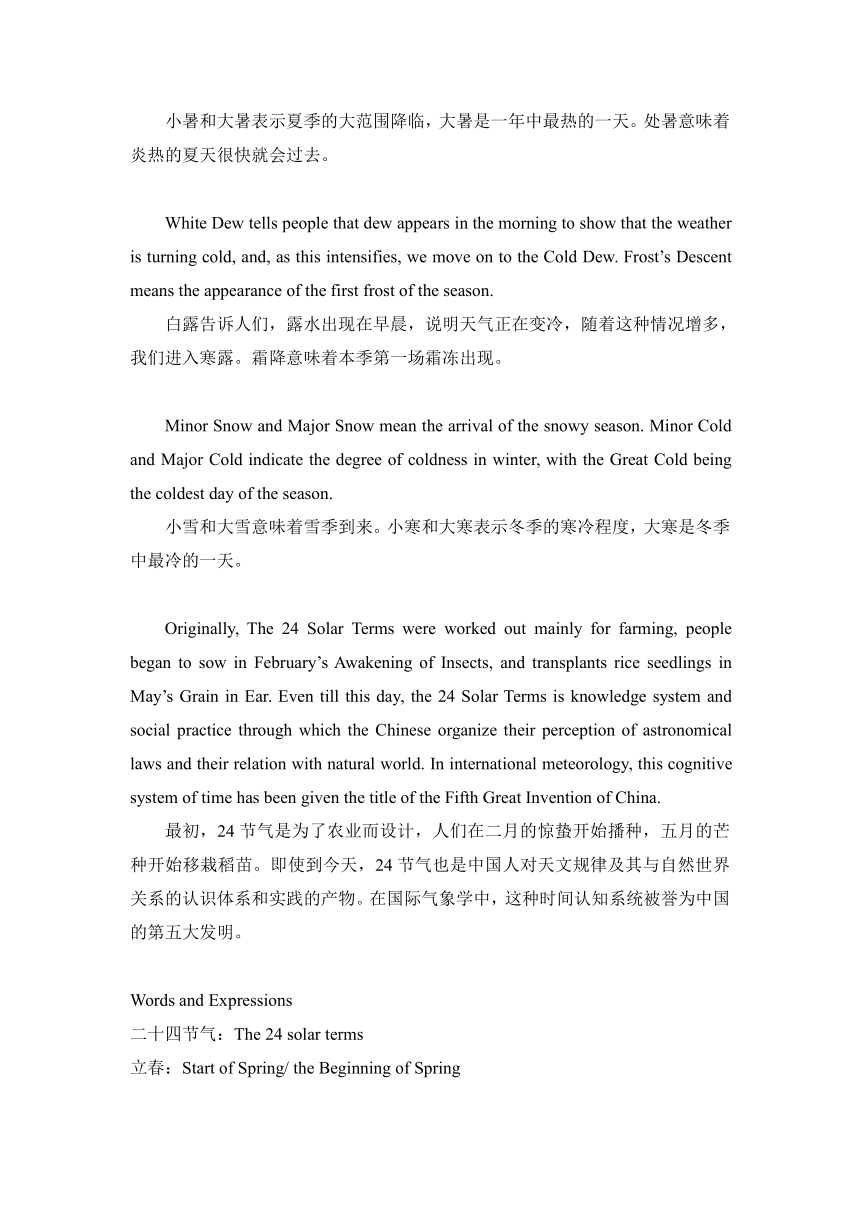
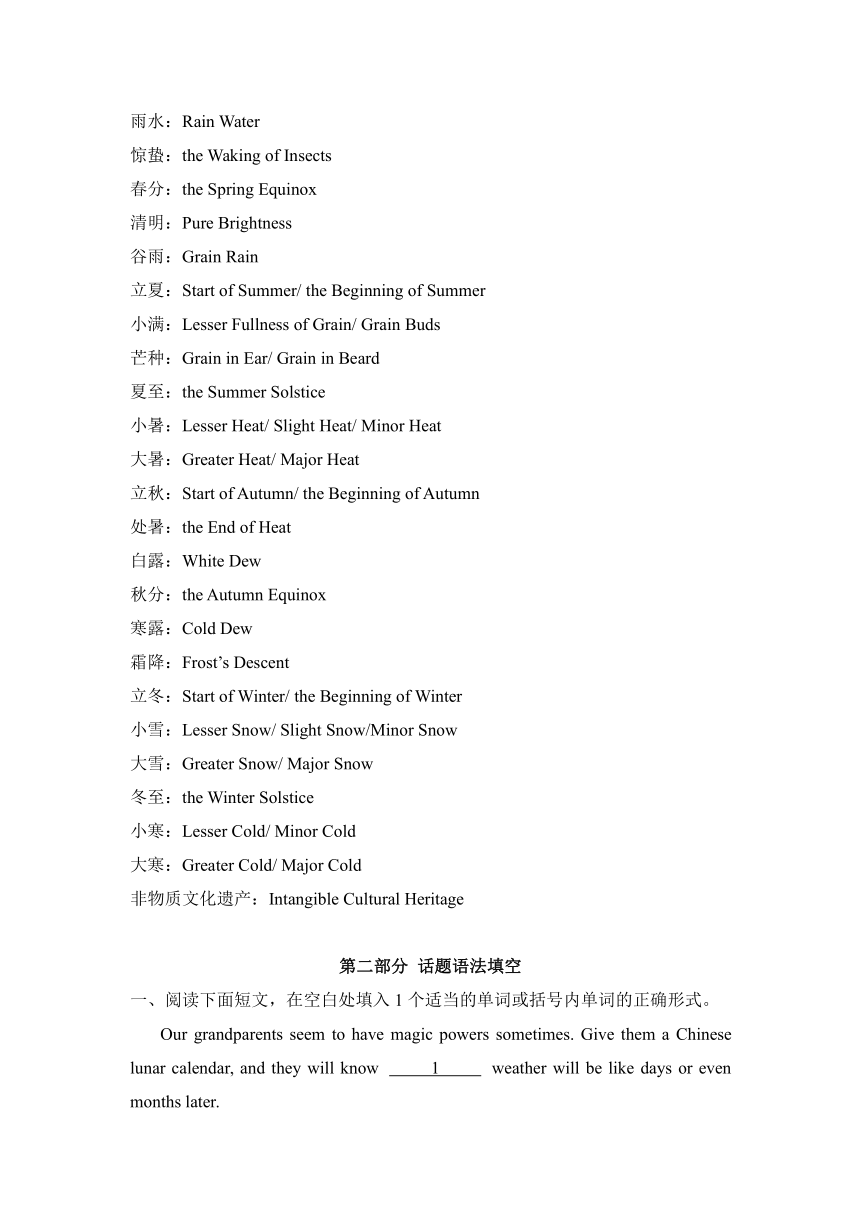
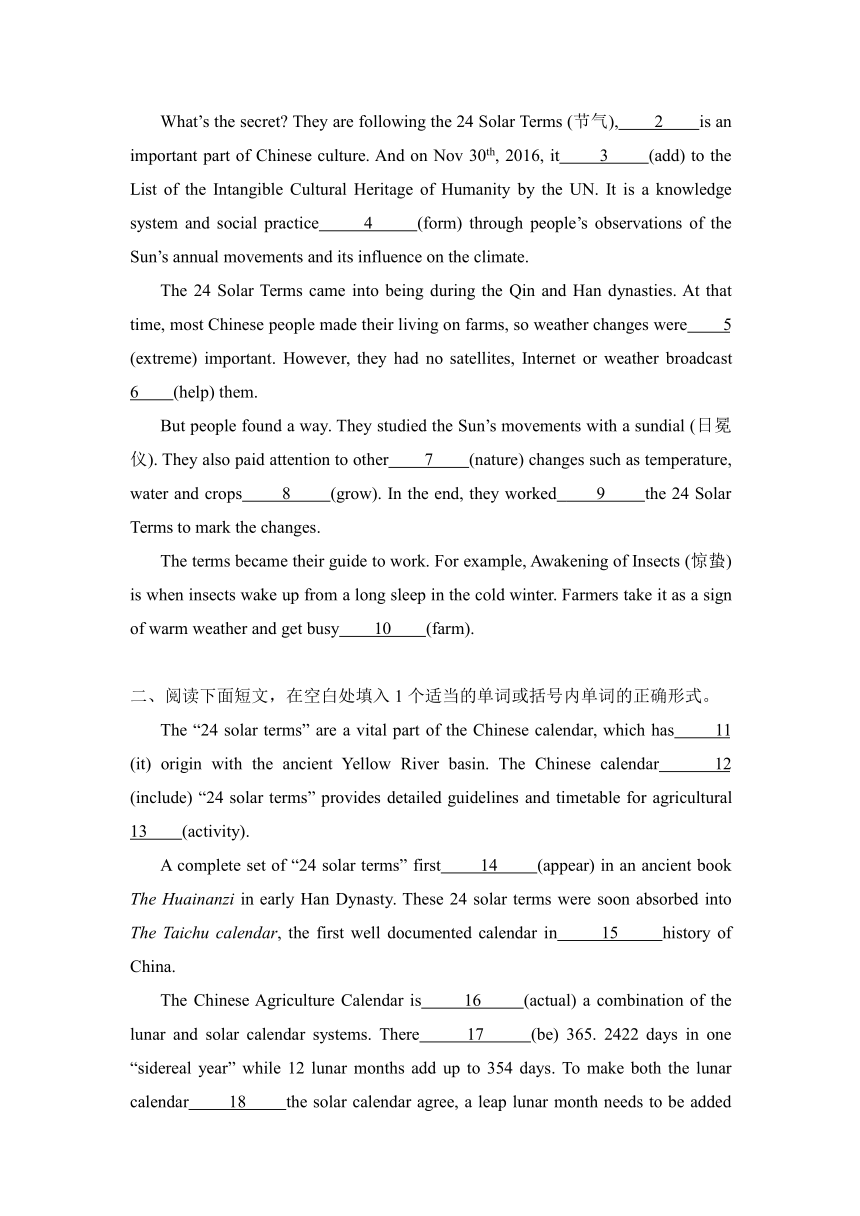
文档简介
高中英语阅读写作素材之中国传统文化
中国民俗 节气(素材+语法填空+书面表达)
第一部分 话题素材积累
For thousand years, the 24 Solar Terms has profoundly influenced Chinese people’s way of thinking and code conduct. It is a vivid evidence of the cultural diversity of humanity. On December 1, 2016, the solar terms were listed by UNESCO as an Intangible Cultural Heritage.
几千年来,二十四节气深刻影响着中国人的思维方式和行为准则,是人类文化多样性的生动证明。2016年12月1日,节气被联合国教科文组织列为非物质文化遗产。
The 24 solar terms, based on the sun's position in the zodiac, were created by farmers in ancient China to guide the agricultural affairs and farming activities. The 24 solar terms reflect the changes in climate, natural phenomena, agricultural production, and other aspects of human life, including clothing, food, housing, and transportation. The 24 solar terms play important roles and have greatly influenced people's basic needs in life, and they still have an important function nowadays.
二十四节气是中国古代农民为了指导农业事务和农耕活动,根据太阳在十二生肖中的位置而制定的。它反映了气候、自然现象、农业生产以及人类生活其他方面的变化,包括衣、食、住、行。二十四节气极大地影响了人们的基本生活需要,至今仍具有重要作用。
Around 2000 years ago, ancient Chinese divided the sun’s annual circular motion into 24 equal segments, each segment was called a “Solar Term”, which represented a unique period of a year. The 24 Solar Terms became the important kind of calendar in ancient China.
大约在2000年前,古代中国人把太阳每年的周期运动分为24个相等的部分,每个部分被称为“节气”,代表一年中某个独特的时期。24节气成了中国古代重要的一种历法。
Within the 24 Solar Terms, Start of Spring, Start of Summer, Start of Autumn and Start of Winter marks the start of four seasons.
24节气中,立春、立夏、立秋、立冬标志着四季的开始。
Spring Equinox and Autumn Equinox are the two points where the day and night are equal. Summer Solstice has the longest day and shortest night in a year, while the opposite is true for Winter Solstice.
春分和秋分是一年中白天和黑夜时长相同的两个日子。夏至是一年中白天最长、夜晚最短的一天,而冬至日则相反。
Rain Water means the start of the spring rains. Awakening of Insects indicates that the spring thunder awakens hibernating insects.
雨水意味着春天开始下雨。惊蛰是指春雷唤醒冬眠的昆虫。清明当明亮而干净的春日景象取代冬天寒冷枯黄的景象时,意味着春天的到来。
Pure Brightness means the onset of spring when a bright and clean spring scene replaces the cold, withered and yellow scene in winter. Grain Rain indicates that from that day, there will be more rainfall, which is beneficial to the growth of crops. Grain Buds shows that crops that will ripen in summer start to show plump seeds. Grain in Ear tells people that the wheat has ripened.
清明是指春天的到来,一个明亮、干净的春天景象取代了冬天的寒冷、枯黄景象。谷雨预示着从那天起,降雨将增多,这对作物的生长有利。小满意味着将在夏季成熟的作物开始长出饱满的种子。芒种告诉人们小麦已经成熟了。
Minor Heat and Major Heat indicate the full onset of summer, with the Major Heat being the hottest day of the year. End of Heat shows that scorching summer days will soon be gone.
小暑和大暑表示夏季的大范围降临,大暑是一年中最热的一天。处暑意味着炎热的夏天很快就会过去。
White Dew tells people that dew appears in the morning to show that the weather is turning cold, and, as this intensifies, we move on to the Cold Dew. Frost’s Descent means the appearance of the first frost of the season.
白露告诉人们,露水出现在早晨,说明天气正在变冷,随着这种情况增多,我们进入寒露。霜降意味着本季第一场霜冻出现。
Minor Snow and Major Snow mean the arrival of the snowy season. Minor Cold and Major Cold indicate the degree of coldness in winter, with the Great Cold being the coldest day of the season.
小雪和大雪意味着雪季到来。小寒和大寒表示冬季的寒冷程度,大寒是冬季中最冷的一天。
Originally, The 24 Solar Terms were worked out mainly for farming, people began to sow in February’s Awakening of Insects, and transplants rice seedlings in May’s Grain in Ear. Even till this day, the 24 Solar Terms is knowledge system and social practice through which the Chinese organize their perception of astronomical laws and their relation with natural world. In international meteorology, this cognitive system of time has been given the title of the Fifth Great Invention of China.
最初,24节气是为了农业而设计,人们在二月的惊蛰开始播种,五月的芒种开始移栽稻苗。即使到今天,24节气也是中国人对天文规律及其与自然世界关系的认识体系和实践的产物。在国际气象学中,这种时间认知系统被誉为中国的第五大发明。
Words and Expressions
二十四节气:The 24 solar terms
立春:Start of Spring/ the Beginning of Spring
雨水:Rain Water
惊蛰:the Waking of Insects
春分:the Spring Equinox
清明:Pure Brightness
谷雨:Grain Rain
立夏:Start of Summer/ the Beginning of Summer
小满:Lesser Fullness of Grain/ Grain Buds
芒种:Grain in Ear/ Grain in Beard
夏至:the Summer Solstice
小暑:Lesser Heat/ Slight Heat/ Minor Heat
大暑:Greater Heat/ Major Heat
立秋:Start of Autumn/ the Beginning of Autumn
处暑:the End of Heat
白露:White Dew
秋分:the Autumn Equinox
寒露:Cold Dew
霜降:Frost’s Descent
立冬:Start of Winter/ the Beginning of Winter
小雪:Lesser Snow/ Slight Snow/Minor Snow
大雪:Greater Snow/ Major Snow
冬至:the Winter Solstice
小寒:Lesser Cold/ Minor Cold
大寒:Greater Cold/ Major Cold
非物质文化遗产:Intangible Cultural Heritage
第二部分 话题语法填空
一、阅读下面短文,在空白处填入1个适当的单词或括号内单词的正确形式。
Our grandparents seem to have magic powers sometimes. Give them a Chinese lunar calendar, and they will know 1 weather will be like days or even months later.
What’s the secret They are following the 24 Solar Terms (节气), 2 is an important part of Chinese culture. And on Nov 30th, 2016, it 3 (add) to the List of the Intangible Cultural Heritage of Humanity by the UN. It is a knowledge system and social practice 4 (form) through people’s observations of the Sun’s annual movements and its influence on the climate.
The 24 Solar Terms came into being during the Qin and Han dynasties. At that time, most Chinese people made their living on farms, so weather changes were 5 (extreme) important. However, they had no satellites, Internet or weather broadcast 6 (help) them.
But people found a way. They studied the Sun’s movements with a sundial (日冕仪). They also paid attention to other 7 (nature) changes such as temperature, water and crops 8 (grow). In the end, they worked 9 the 24 Solar Terms to mark the changes.
The terms became their guide to work. For example, Awakening of Insects (惊蛰) is when insects wake up from a long sleep in the cold winter. Farmers take it as a sign of warm weather and get busy 10 (farm).
二、阅读下面短文,在空白处填入1个适当的单词或括号内单词的正确形式。
The “24 solar terms” are a vital part of the Chinese calendar, which has 11 (it) origin with the ancient Yellow River basin. The Chinese calendar 12 (include) “24 solar terms” provides detailed guidelines and timetable for agricultural 13 (activity).
A complete set of “24 solar terms” first 14 (appear) in an ancient book The Huainanzi in early Han Dynasty. These 24 solar terms were soon absorbed into The Taichu calendar, the first well documented calendar in 15 history of China.
The Chinese Agriculture Calendar is 16 (actual) a combination of the lunar and solar calendar systems. There 17 (be) 365. 2422 days in one “sidereal year” while 12 lunar months add up to 354 days. To make both the lunar calendar 18 the solar calendar agree, a leap lunar month needs to be added every 2 to 3 years. Since the early Han Dynasty, a lunar month without a major solar term 19 (adopt) as a leap month (闰月) .
With more far-reaching cultural exchanges, the “24 solar terms” have been known to people in other parts of the world and 20 (add)to the “UNESCO World Intangible Cultural Heritage” list in 2016.
三、阅读下面短文,在空白处填入1个适当的单词或括号内单词的正确形式。
Falling around December 22nd, the winter solstice (冬至) is one of the traditional Chinese festivals 21 also one of the 24 solar terms (节气).
The winter solstice festival originated from the Han Dynasty (202 BC-220 AD) and 22 (develop) well in the Tang and Song dynasties (618-1279). People in the old times attached great 23 (important) to the festival. In the Han Dynasty, the festival was regarded as the Winter Festival and people had one day off for the holiday. Officials organized the ceremonies 24 (celebrate) the day and people visited each other with delicious food.
Traditions and customs for the day vary 25 different areas of China. In the northern part of China, people usually eat dumplings, and mutton to celebrate the day. In the southern part, tang yuan and noodles are the festival food. The dumpling is the 26 (essence) food for people in northern China. After the winter solstice, it will become colder and colder. By eating dumplings, people think they can avoid 27 (they) ears from being frozen as the dumplings look like people’s ear.
Tangyuan, 28 is popular in southern China, is a kind of glutinous rice (糯米) ball with different fillings. It can 29 (boil) or fried. People think after 30 (eat) it, they will age one. People also use it to present to relatives and friends.
第三部分 话题写作
假定你是某国际学校的学生李华,你校将于下周五举办一场有关二十四节气(the 24 solar terms)的英文知识讲座。请你给留学生朋友Peter写封邮件邀请他参加,内容包括:
1.写信目的;
2.讲座的信息:时间、地点和内容等;
3.期待回复。
注意:写作词数应为80左右。
________________________________________________________________________________________________________________________________________________________________________________________________________________________________________________________________________________________________________________________________________________________________________________________________________________________________________________________________________________________________________________________________________________________________________
【参考答案】
话题语法填空
一、
what 2.which 3.was added 4.formed 5.extremely
6.to help 7.natural 8.growth 9.out 10.farming
【导语】这是一篇说明文。二十四节气是中国文化的重要组成部分,文章对其进行了介绍。
1.考查名词性从句。句意:给他们一个中国农历,他们就会知道几天甚至几个月后的天气情况。在宾语从句中缺少宾语,且是指事物,所以应用连接代词what。故填what。
2.考查定语从句。句意:他们遵循二十四节气,这是中国文化的重要组成部分。在非限制性定语从句缺少主语,且先行词为the 24 Solar Terms,所以应用关系代词which。故填which。
3.考查一般过去时的被动语态和主谓一致。句意:2016年11月30日,它被联合国列入《人类非物质文化遗产名录》。根据“on Nov 30th, 2016”可知,此处应用一般过去时。动词add意为“添加”,和主语构成被动关系。主语it为第三人称单数。故填was added。
4.考查过去分词。句意:它是人们通过观察太阳的年度运动及其对气候的影响而形成的一种知识体系和社会实践。动词form意为“形成”,和系动词之间没有连词,和逻辑主语a knowledge system and social practice构成被动关系,且动作已完成,所以应用过去分词形式作后置定语。故填formed。
5.考查副词。句意:当时,大多数中国人以农业为生,所以天气变化非常重要。修饰形容词important应用副词extremely表示“非常”作状语。故填extremely。
6.考查动词不定式。句意:然而,他们没有卫星、互联网或天气广播来帮助他们。根据“they had no satellites, Internet or weather broadcast”可知,此处应用to do不定式作后置定语。动词help意为“帮助”。故填to help。
7.考查形容词。句意:他们还关注了其他自然变化,如温度、水和作物生长。此处修饰名词changes应用形容词natural表示“自然的”作定语。故填natural。
8.考查名词。句意:他们还关注了其他自然变化,如温度、水和作物生长。此处作宾语应用名词growth表示“生长”。故填growth。
9.考查介词。句意:最后,他们制定了24节气来标记这些变化。根据“the 24 Solar Terms to mark the changes”可知,此处是指制定了24节气。work out意为“制定”,所以此处应用副词out。故填out。
10.考查动名词。句意:农民们把它当作天气变暖的信号,开始忙着种地。get busy (in) doing意为“忙于做某事”,为固定搭配,所以此处应用动名词作宾语。动词farm意为“种地”。故填farming。
二、
11.its 12.including 13.activities 14.appeared 15.the 16.actually 17.are 18.and 19.has been adopted 20.were added
【导语】本文是一篇说明文。这篇文章介绍了中国农历中的24节气是中国农业历法中重要的一部分,起源于中国古代黄河流域。24节气已经为世界其他地区人们所知,并于2016年被列入“联合国教科文组织非物质文化遗产”名录。
11.考查代词。句意:“二十四节气”是中国历法的重要组成部分,它起源于古老的黄河流域。分析句子,设空处使用代词it的形容词物主代词修饰名词origin。故填its。
12.考查介词。句意:中国农历包括“二十四节气”,为农业活动提供了详细的指导方针和时间表。名词24 solar terms前用介词形式。表示“包括”,用介词including。故填including。
13.考查名词的数。句意:同上。分析句子,设空处使用名词作宾语,activity意为“活动”,此处表示“各种活动”,复数意义,所以用复数形式。故填activities。
14.考查时态。句意:一套完整的“二十四节气”最早出现在汉初的古书《淮南子》中。分析句子,设空处使用动词作谓语,根据in early Han Dynasty可知,句子表述过去事实,故使用一般过去时。故填appeared。
15.考查冠词。句意:这24个节气很快就被纳入了中国历史上第一个有完整记载的历法——《太初历》。分析句子,句中history为名词,设空处使用冠词,此处表示特指。故填the。
16.考查副词。句意:中国农历实际上是阴历和阳历系统的结合。分析句子,设空处使用副词作状语,actually意为“实际地”,符合句意。故填actually。
17.考查时态和主谓一致。句意:一年的“恒星岁”有365.2422天,而12个月的农历岁只有354天。分析句子,设空处使用动词作谓语,此处表示客观事实,主语为365. 2422 days是复数,谓语动词用复数形式。故填are。
18.考查连词。句意:为了使阴历和阳历一致,需要每2到3年增加一个闰月。句中both…and…为固定短语,意为“两者都”。故填and。
19.考查动词。句意:自汉朝早期以来,没有主要节气的农历月份被采用为闰月。分析句子,句中since+过去的时间为现在完成时时间标志,同时句子的主语a lunar month,单数,与adopt之间是被动关系,故使用现在完成时的被动语态。故填has been adopted。
20.考查时态和语态。句意:随着文化交流的深入,“二十四节气”被世界各地的人们所熟知,并于2016年被联合国教科文组织列入“世界非物质文化遗产”名录。分析句子,设空处使用动词作谓语,句中in 2016表示动作发生在过去,故使用一般过去时,同时24 solar terms与add之间是被动关系,故使用一般过去时的被动语态。故填were added。
三、
21.and 22.developed 23.importance 24.to celebrate 25.in 26.essential 27.their 28.which 29.be boiled 30.eating
【导语】本文是一篇说明文。文章介绍了中国二十四节气中的冬至以及其相关的信息。
21.考查连词。句意:冬至大约在12月22日,是中国的传统节日之一,也是24节气之一。one of the traditional Chinese festivals和also one of the 24 solar terms是并列关系,所以用并列连词and。故填and。
22.考查时态。句意:冬至节日起源于汉代(公元前202年-公元220年),在唐宋时期(618-1279年)发展得很好。所填词作谓语,根据时间状语 in the Tang and Song dynasties判断,用一般过去时。故填developed。
23.考查名词。句意:旧时代的人们非常重视这个节日。根据形容词great判断,所填词用名词,在句中作宾语。故填importance。
24.考查非谓语动词。句意:官员们组织仪式来庆祝这一天,人们用美味的食物互相拜访。所填词作目的状语,用动词不定式。故填to celebrate。
25.考查介词。句意:这一天的传统和习俗在中国不同地区各不相同。vary in sth.为固定搭配,意为“在某方面不同”。故填in。
26.考查形容词。句意:饺子是中国北方人必不可少的食物。所填词作定语,修饰food,用形容词。故填essential。
27.考查代词。句意:通过吃饺子,人们认为他们可以避免耳朵被冻住,因为饺子看起来像人的耳朵。所填词作定语,修饰名词ears,用形容词性物主代词。故填their。
28.考查定语从句。句意:汤圆是一种有不同馅料的糯米团,在中国南方很受欢迎。所填词引导非限制性定语从句,指代tang yuan,在从句中作主语,所以用关系代词which引导。故填which。
29.考查语态。句意:它可以煮也可以炸。it指代tang yuan,与 boil之间为被动关系,且情态动词后接动词原形。故填be boiled。
30.考查非谓语动词。句意:人们认为吃了它,他们就会老一岁。所填词放在介词after后面,且后面有宾语it,所以用动名词。故填eating。
话题写作
One possible version:
Dear Peter,
I’m writing to invite you to attend a lecture about the 24 solar terms, as I know you are very interested in traditional Chinese culture. The lecture will be held in the school hall from 8:00 a.m. to 11:00 a.m. on March 24th.
The lecturer will first introduce the meaning of the 24 solar terms and then explain their origin. Afterwards, there will be a free discussion where students will be free to ask some questions.
Hope that you can come. Looking forward to your earliest reply.
Yours,
Li Hua
【导语】本篇书面表达属于应用文。要求考生给留学生朋友Peter写封邮件邀请他参加你校将于下周五举办一场有关二十四节气(the 24 solar terms)的英文知识讲座。内容包括:1.写信目的;2.讲座的信息:时间、地点和内容等;3.期待回复。
【详解】1.词汇积累
参加:attend→join in
对……感兴趣:be interested in→have an interest in
举行、组织:hold→organize
解释:explain→illustrate
2.句式拓展
简单句变复合句
原句:The lecture will be held in the school hall from 8:00 a.m. to 11:00 a.m. on March 24th.
拓展句:The lecture will be held in the school hall, which will start from 8:00 a.m. to 11:00 a.m. on March 24th.
【点睛】【高分句型1】I’m writing to invite you to attend a lecture about the 24 solar terms, as I know you are very interested in traditional Chinese culture. (运用了as引导的原因状语从句)
【高分句型2】Afterwards, there will be a free discussion where students will be free to ask some questions. (运用了where引导的限制性定语从句)
中国民俗 节气(素材+语法填空+书面表达)
第一部分 话题素材积累
For thousand years, the 24 Solar Terms has profoundly influenced Chinese people’s way of thinking and code conduct. It is a vivid evidence of the cultural diversity of humanity. On December 1, 2016, the solar terms were listed by UNESCO as an Intangible Cultural Heritage.
几千年来,二十四节气深刻影响着中国人的思维方式和行为准则,是人类文化多样性的生动证明。2016年12月1日,节气被联合国教科文组织列为非物质文化遗产。
The 24 solar terms, based on the sun's position in the zodiac, were created by farmers in ancient China to guide the agricultural affairs and farming activities. The 24 solar terms reflect the changes in climate, natural phenomena, agricultural production, and other aspects of human life, including clothing, food, housing, and transportation. The 24 solar terms play important roles and have greatly influenced people's basic needs in life, and they still have an important function nowadays.
二十四节气是中国古代农民为了指导农业事务和农耕活动,根据太阳在十二生肖中的位置而制定的。它反映了气候、自然现象、农业生产以及人类生活其他方面的变化,包括衣、食、住、行。二十四节气极大地影响了人们的基本生活需要,至今仍具有重要作用。
Around 2000 years ago, ancient Chinese divided the sun’s annual circular motion into 24 equal segments, each segment was called a “Solar Term”, which represented a unique period of a year. The 24 Solar Terms became the important kind of calendar in ancient China.
大约在2000年前,古代中国人把太阳每年的周期运动分为24个相等的部分,每个部分被称为“节气”,代表一年中某个独特的时期。24节气成了中国古代重要的一种历法。
Within the 24 Solar Terms, Start of Spring, Start of Summer, Start of Autumn and Start of Winter marks the start of four seasons.
24节气中,立春、立夏、立秋、立冬标志着四季的开始。
Spring Equinox and Autumn Equinox are the two points where the day and night are equal. Summer Solstice has the longest day and shortest night in a year, while the opposite is true for Winter Solstice.
春分和秋分是一年中白天和黑夜时长相同的两个日子。夏至是一年中白天最长、夜晚最短的一天,而冬至日则相反。
Rain Water means the start of the spring rains. Awakening of Insects indicates that the spring thunder awakens hibernating insects.
雨水意味着春天开始下雨。惊蛰是指春雷唤醒冬眠的昆虫。清明当明亮而干净的春日景象取代冬天寒冷枯黄的景象时,意味着春天的到来。
Pure Brightness means the onset of spring when a bright and clean spring scene replaces the cold, withered and yellow scene in winter. Grain Rain indicates that from that day, there will be more rainfall, which is beneficial to the growth of crops. Grain Buds shows that crops that will ripen in summer start to show plump seeds. Grain in Ear tells people that the wheat has ripened.
清明是指春天的到来,一个明亮、干净的春天景象取代了冬天的寒冷、枯黄景象。谷雨预示着从那天起,降雨将增多,这对作物的生长有利。小满意味着将在夏季成熟的作物开始长出饱满的种子。芒种告诉人们小麦已经成熟了。
Minor Heat and Major Heat indicate the full onset of summer, with the Major Heat being the hottest day of the year. End of Heat shows that scorching summer days will soon be gone.
小暑和大暑表示夏季的大范围降临,大暑是一年中最热的一天。处暑意味着炎热的夏天很快就会过去。
White Dew tells people that dew appears in the morning to show that the weather is turning cold, and, as this intensifies, we move on to the Cold Dew. Frost’s Descent means the appearance of the first frost of the season.
白露告诉人们,露水出现在早晨,说明天气正在变冷,随着这种情况增多,我们进入寒露。霜降意味着本季第一场霜冻出现。
Minor Snow and Major Snow mean the arrival of the snowy season. Minor Cold and Major Cold indicate the degree of coldness in winter, with the Great Cold being the coldest day of the season.
小雪和大雪意味着雪季到来。小寒和大寒表示冬季的寒冷程度,大寒是冬季中最冷的一天。
Originally, The 24 Solar Terms were worked out mainly for farming, people began to sow in February’s Awakening of Insects, and transplants rice seedlings in May’s Grain in Ear. Even till this day, the 24 Solar Terms is knowledge system and social practice through which the Chinese organize their perception of astronomical laws and their relation with natural world. In international meteorology, this cognitive system of time has been given the title of the Fifth Great Invention of China.
最初,24节气是为了农业而设计,人们在二月的惊蛰开始播种,五月的芒种开始移栽稻苗。即使到今天,24节气也是中国人对天文规律及其与自然世界关系的认识体系和实践的产物。在国际气象学中,这种时间认知系统被誉为中国的第五大发明。
Words and Expressions
二十四节气:The 24 solar terms
立春:Start of Spring/ the Beginning of Spring
雨水:Rain Water
惊蛰:the Waking of Insects
春分:the Spring Equinox
清明:Pure Brightness
谷雨:Grain Rain
立夏:Start of Summer/ the Beginning of Summer
小满:Lesser Fullness of Grain/ Grain Buds
芒种:Grain in Ear/ Grain in Beard
夏至:the Summer Solstice
小暑:Lesser Heat/ Slight Heat/ Minor Heat
大暑:Greater Heat/ Major Heat
立秋:Start of Autumn/ the Beginning of Autumn
处暑:the End of Heat
白露:White Dew
秋分:the Autumn Equinox
寒露:Cold Dew
霜降:Frost’s Descent
立冬:Start of Winter/ the Beginning of Winter
小雪:Lesser Snow/ Slight Snow/Minor Snow
大雪:Greater Snow/ Major Snow
冬至:the Winter Solstice
小寒:Lesser Cold/ Minor Cold
大寒:Greater Cold/ Major Cold
非物质文化遗产:Intangible Cultural Heritage
第二部分 话题语法填空
一、阅读下面短文,在空白处填入1个适当的单词或括号内单词的正确形式。
Our grandparents seem to have magic powers sometimes. Give them a Chinese lunar calendar, and they will know 1 weather will be like days or even months later.
What’s the secret They are following the 24 Solar Terms (节气), 2 is an important part of Chinese culture. And on Nov 30th, 2016, it 3 (add) to the List of the Intangible Cultural Heritage of Humanity by the UN. It is a knowledge system and social practice 4 (form) through people’s observations of the Sun’s annual movements and its influence on the climate.
The 24 Solar Terms came into being during the Qin and Han dynasties. At that time, most Chinese people made their living on farms, so weather changes were 5 (extreme) important. However, they had no satellites, Internet or weather broadcast 6 (help) them.
But people found a way. They studied the Sun’s movements with a sundial (日冕仪). They also paid attention to other 7 (nature) changes such as temperature, water and crops 8 (grow). In the end, they worked 9 the 24 Solar Terms to mark the changes.
The terms became their guide to work. For example, Awakening of Insects (惊蛰) is when insects wake up from a long sleep in the cold winter. Farmers take it as a sign of warm weather and get busy 10 (farm).
二、阅读下面短文,在空白处填入1个适当的单词或括号内单词的正确形式。
The “24 solar terms” are a vital part of the Chinese calendar, which has 11 (it) origin with the ancient Yellow River basin. The Chinese calendar 12 (include) “24 solar terms” provides detailed guidelines and timetable for agricultural 13 (activity).
A complete set of “24 solar terms” first 14 (appear) in an ancient book The Huainanzi in early Han Dynasty. These 24 solar terms were soon absorbed into The Taichu calendar, the first well documented calendar in 15 history of China.
The Chinese Agriculture Calendar is 16 (actual) a combination of the lunar and solar calendar systems. There 17 (be) 365. 2422 days in one “sidereal year” while 12 lunar months add up to 354 days. To make both the lunar calendar 18 the solar calendar agree, a leap lunar month needs to be added every 2 to 3 years. Since the early Han Dynasty, a lunar month without a major solar term 19 (adopt) as a leap month (闰月) .
With more far-reaching cultural exchanges, the “24 solar terms” have been known to people in other parts of the world and 20 (add)to the “UNESCO World Intangible Cultural Heritage” list in 2016.
三、阅读下面短文,在空白处填入1个适当的单词或括号内单词的正确形式。
Falling around December 22nd, the winter solstice (冬至) is one of the traditional Chinese festivals 21 also one of the 24 solar terms (节气).
The winter solstice festival originated from the Han Dynasty (202 BC-220 AD) and 22 (develop) well in the Tang and Song dynasties (618-1279). People in the old times attached great 23 (important) to the festival. In the Han Dynasty, the festival was regarded as the Winter Festival and people had one day off for the holiday. Officials organized the ceremonies 24 (celebrate) the day and people visited each other with delicious food.
Traditions and customs for the day vary 25 different areas of China. In the northern part of China, people usually eat dumplings, and mutton to celebrate the day. In the southern part, tang yuan and noodles are the festival food. The dumpling is the 26 (essence) food for people in northern China. After the winter solstice, it will become colder and colder. By eating dumplings, people think they can avoid 27 (they) ears from being frozen as the dumplings look like people’s ear.
Tangyuan, 28 is popular in southern China, is a kind of glutinous rice (糯米) ball with different fillings. It can 29 (boil) or fried. People think after 30 (eat) it, they will age one. People also use it to present to relatives and friends.
第三部分 话题写作
假定你是某国际学校的学生李华,你校将于下周五举办一场有关二十四节气(the 24 solar terms)的英文知识讲座。请你给留学生朋友Peter写封邮件邀请他参加,内容包括:
1.写信目的;
2.讲座的信息:时间、地点和内容等;
3.期待回复。
注意:写作词数应为80左右。
________________________________________________________________________________________________________________________________________________________________________________________________________________________________________________________________________________________________________________________________________________________________________________________________________________________________________________________________________________________________________________________________________________________________________
【参考答案】
话题语法填空
一、
what 2.which 3.was added 4.formed 5.extremely
6.to help 7.natural 8.growth 9.out 10.farming
【导语】这是一篇说明文。二十四节气是中国文化的重要组成部分,文章对其进行了介绍。
1.考查名词性从句。句意:给他们一个中国农历,他们就会知道几天甚至几个月后的天气情况。在宾语从句中缺少宾语,且是指事物,所以应用连接代词what。故填what。
2.考查定语从句。句意:他们遵循二十四节气,这是中国文化的重要组成部分。在非限制性定语从句缺少主语,且先行词为the 24 Solar Terms,所以应用关系代词which。故填which。
3.考查一般过去时的被动语态和主谓一致。句意:2016年11月30日,它被联合国列入《人类非物质文化遗产名录》。根据“on Nov 30th, 2016”可知,此处应用一般过去时。动词add意为“添加”,和主语构成被动关系。主语it为第三人称单数。故填was added。
4.考查过去分词。句意:它是人们通过观察太阳的年度运动及其对气候的影响而形成的一种知识体系和社会实践。动词form意为“形成”,和系动词之间没有连词,和逻辑主语a knowledge system and social practice构成被动关系,且动作已完成,所以应用过去分词形式作后置定语。故填formed。
5.考查副词。句意:当时,大多数中国人以农业为生,所以天气变化非常重要。修饰形容词important应用副词extremely表示“非常”作状语。故填extremely。
6.考查动词不定式。句意:然而,他们没有卫星、互联网或天气广播来帮助他们。根据“they had no satellites, Internet or weather broadcast”可知,此处应用to do不定式作后置定语。动词help意为“帮助”。故填to help。
7.考查形容词。句意:他们还关注了其他自然变化,如温度、水和作物生长。此处修饰名词changes应用形容词natural表示“自然的”作定语。故填natural。
8.考查名词。句意:他们还关注了其他自然变化,如温度、水和作物生长。此处作宾语应用名词growth表示“生长”。故填growth。
9.考查介词。句意:最后,他们制定了24节气来标记这些变化。根据“the 24 Solar Terms to mark the changes”可知,此处是指制定了24节气。work out意为“制定”,所以此处应用副词out。故填out。
10.考查动名词。句意:农民们把它当作天气变暖的信号,开始忙着种地。get busy (in) doing意为“忙于做某事”,为固定搭配,所以此处应用动名词作宾语。动词farm意为“种地”。故填farming。
二、
11.its 12.including 13.activities 14.appeared 15.the 16.actually 17.are 18.and 19.has been adopted 20.were added
【导语】本文是一篇说明文。这篇文章介绍了中国农历中的24节气是中国农业历法中重要的一部分,起源于中国古代黄河流域。24节气已经为世界其他地区人们所知,并于2016年被列入“联合国教科文组织非物质文化遗产”名录。
11.考查代词。句意:“二十四节气”是中国历法的重要组成部分,它起源于古老的黄河流域。分析句子,设空处使用代词it的形容词物主代词修饰名词origin。故填its。
12.考查介词。句意:中国农历包括“二十四节气”,为农业活动提供了详细的指导方针和时间表。名词24 solar terms前用介词形式。表示“包括”,用介词including。故填including。
13.考查名词的数。句意:同上。分析句子,设空处使用名词作宾语,activity意为“活动”,此处表示“各种活动”,复数意义,所以用复数形式。故填activities。
14.考查时态。句意:一套完整的“二十四节气”最早出现在汉初的古书《淮南子》中。分析句子,设空处使用动词作谓语,根据in early Han Dynasty可知,句子表述过去事实,故使用一般过去时。故填appeared。
15.考查冠词。句意:这24个节气很快就被纳入了中国历史上第一个有完整记载的历法——《太初历》。分析句子,句中history为名词,设空处使用冠词,此处表示特指。故填the。
16.考查副词。句意:中国农历实际上是阴历和阳历系统的结合。分析句子,设空处使用副词作状语,actually意为“实际地”,符合句意。故填actually。
17.考查时态和主谓一致。句意:一年的“恒星岁”有365.2422天,而12个月的农历岁只有354天。分析句子,设空处使用动词作谓语,此处表示客观事实,主语为365. 2422 days是复数,谓语动词用复数形式。故填are。
18.考查连词。句意:为了使阴历和阳历一致,需要每2到3年增加一个闰月。句中both…and…为固定短语,意为“两者都”。故填and。
19.考查动词。句意:自汉朝早期以来,没有主要节气的农历月份被采用为闰月。分析句子,句中since+过去的时间为现在完成时时间标志,同时句子的主语a lunar month,单数,与adopt之间是被动关系,故使用现在完成时的被动语态。故填has been adopted。
20.考查时态和语态。句意:随着文化交流的深入,“二十四节气”被世界各地的人们所熟知,并于2016年被联合国教科文组织列入“世界非物质文化遗产”名录。分析句子,设空处使用动词作谓语,句中in 2016表示动作发生在过去,故使用一般过去时,同时24 solar terms与add之间是被动关系,故使用一般过去时的被动语态。故填were added。
三、
21.and 22.developed 23.importance 24.to celebrate 25.in 26.essential 27.their 28.which 29.be boiled 30.eating
【导语】本文是一篇说明文。文章介绍了中国二十四节气中的冬至以及其相关的信息。
21.考查连词。句意:冬至大约在12月22日,是中国的传统节日之一,也是24节气之一。one of the traditional Chinese festivals和also one of the 24 solar terms是并列关系,所以用并列连词and。故填and。
22.考查时态。句意:冬至节日起源于汉代(公元前202年-公元220年),在唐宋时期(618-1279年)发展得很好。所填词作谓语,根据时间状语 in the Tang and Song dynasties判断,用一般过去时。故填developed。
23.考查名词。句意:旧时代的人们非常重视这个节日。根据形容词great判断,所填词用名词,在句中作宾语。故填importance。
24.考查非谓语动词。句意:官员们组织仪式来庆祝这一天,人们用美味的食物互相拜访。所填词作目的状语,用动词不定式。故填to celebrate。
25.考查介词。句意:这一天的传统和习俗在中国不同地区各不相同。vary in sth.为固定搭配,意为“在某方面不同”。故填in。
26.考查形容词。句意:饺子是中国北方人必不可少的食物。所填词作定语,修饰food,用形容词。故填essential。
27.考查代词。句意:通过吃饺子,人们认为他们可以避免耳朵被冻住,因为饺子看起来像人的耳朵。所填词作定语,修饰名词ears,用形容词性物主代词。故填their。
28.考查定语从句。句意:汤圆是一种有不同馅料的糯米团,在中国南方很受欢迎。所填词引导非限制性定语从句,指代tang yuan,在从句中作主语,所以用关系代词which引导。故填which。
29.考查语态。句意:它可以煮也可以炸。it指代tang yuan,与 boil之间为被动关系,且情态动词后接动词原形。故填be boiled。
30.考查非谓语动词。句意:人们认为吃了它,他们就会老一岁。所填词放在介词after后面,且后面有宾语it,所以用动名词。故填eating。
话题写作
One possible version:
Dear Peter,
I’m writing to invite you to attend a lecture about the 24 solar terms, as I know you are very interested in traditional Chinese culture. The lecture will be held in the school hall from 8:00 a.m. to 11:00 a.m. on March 24th.
The lecturer will first introduce the meaning of the 24 solar terms and then explain their origin. Afterwards, there will be a free discussion where students will be free to ask some questions.
Hope that you can come. Looking forward to your earliest reply.
Yours,
Li Hua
【导语】本篇书面表达属于应用文。要求考生给留学生朋友Peter写封邮件邀请他参加你校将于下周五举办一场有关二十四节气(the 24 solar terms)的英文知识讲座。内容包括:1.写信目的;2.讲座的信息:时间、地点和内容等;3.期待回复。
【详解】1.词汇积累
参加:attend→join in
对……感兴趣:be interested in→have an interest in
举行、组织:hold→organize
解释:explain→illustrate
2.句式拓展
简单句变复合句
原句:The lecture will be held in the school hall from 8:00 a.m. to 11:00 a.m. on March 24th.
拓展句:The lecture will be held in the school hall, which will start from 8:00 a.m. to 11:00 a.m. on March 24th.
【点睛】【高分句型1】I’m writing to invite you to attend a lecture about the 24 solar terms, as I know you are very interested in traditional Chinese culture. (运用了as引导的原因状语从句)
【高分句型2】Afterwards, there will be a free discussion where students will be free to ask some questions. (运用了where引导的限制性定语从句)
